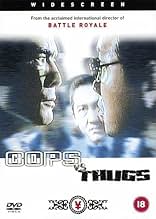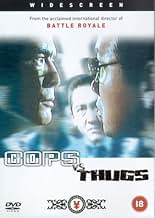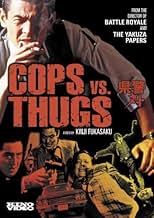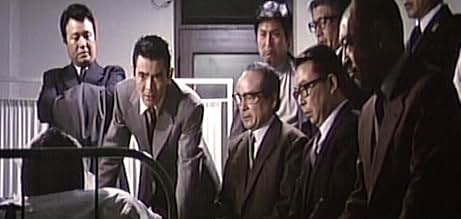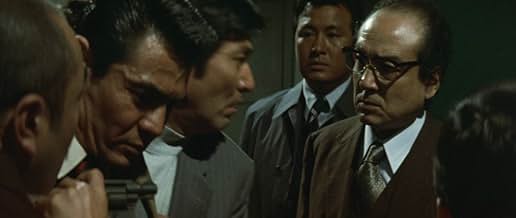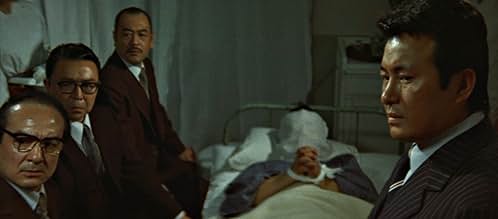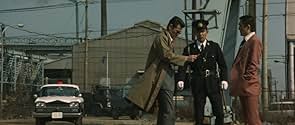IMDb रेटिंग
7.2/10
1 हज़ार
आपकी रेटिंग
अपनी भाषा में प्लॉट जोड़ेंActing boss Hirotani of the Ohara gang uses his friendship with corrupt cop Kuno to usurp a staged land deal that rival yakuza gang Kawade had arranged through local politicians. Open warfar... सभी पढ़ेंActing boss Hirotani of the Ohara gang uses his friendship with corrupt cop Kuno to usurp a staged land deal that rival yakuza gang Kawade had arranged through local politicians. Open warfare erupts between the two gangs.Acting boss Hirotani of the Ohara gang uses his friendship with corrupt cop Kuno to usurp a staged land deal that rival yakuza gang Kawade had arranged through local politicians. Open warfare erupts between the two gangs.
- पुरस्कार
- कुल 2 जीत
फ़ीचर्ड समीक्षाएं
I should start by noting that "Kenkei tai soshiki boryoku" ("Cops vs Thugs" in English) is both the first yakuza movie that I've ever seen and the first Kinji Fukasaku movie that I've ever seen. What an impressive one. This look at a war between rival gangs over a piece of land getting auctioned is one of the grittiest movies that I've ever seen. The protagonist is a cop in the pocket of one of the gangs. We don't tend to think of Japan as a crime-ridden society, but we forget that it still has organized crime (which can actually exist anywhere). This movie shows just how much the authorities were in tow to the yakuza.
I now hope to see Fukasaku's other movies. They'll be hard-pressed to be as intense as this one, but I suspect that they'll be fine pieces of work. In the meantime, check this one out.
I now hope to see Fukasaku's other movies. They'll be hard-pressed to be as intense as this one, but I suspect that they'll be fine pieces of work. In the meantime, check this one out.
Acting boss Hirotani (Hiroki Matsukata) of the Ohara gang uses his friendship with corrupt cop Kuno (Bunta Sugawara) to usurp a staged land deal that rival yakuza gang Kawade had arranged through local politicians. Open warfare erupts between the two gangs.
By 1975, Kinji Fukasaku had made more than 30 films, most if not all of this daunting number in the Toei studio system. Returning to the screen after completing their "Battles Without Honor and Humanity" series together, Fukasaku joined forces once again with screenwriter Kazuo Kasahara, composer Toshiaki Tsushima and star Bunta Sugawara.
We have a story where the corruption is so deep, it almost seems normal. It has been suggested that the title, "Cops Versus Thugs", is meant to imply "Cops as Compared to Thugs" rather than "Cops Fighting Thugs". This would be a wise and apt distinction, as the cops are every bit as involved in the yakuza as the "thugs" in this story. Allegedly the story is loosely based on a true incident (though no one knows what incident this would be), and there is the question of whether this is pure fantasy or some sort of blunt social commentary.
Besides the film's wild violence (sort of the precursor to Takashi Miike), what really stands out is the funky 1970s score from Toshiaki Tsushima, who worked with Fukasaku on the "Honor and Humanity" films as well as many others. One of their earlier collaborations is "The Green Slime" (1968), a personal favorite that was wrongly harangued in the debut episode of Mystery Science Theater 3000.
This is "Fukasaku at the peak of his powers," writes Tom Mes, who really ought to know better than anyone. For me, the peak will always be Fukasaku's final film, "Battle Royale", perhaps simply because it was my first exposure to his work. But of his nearly countless contributions to cinema, "Cops vs Thugs" (despite this terrible English title despite the subtlety mentioned above) is one of his best, and a true joy for anyone who likes crime, action, and maybe just a pinch of sleaze.
Along with a high-definition transfer, Arrow Video brings us "Beyond the Film: Cops vs Thugs", a new 10-minute video appreciation by Fukasaku biographer Sadao Yamane and a new 12-minute visual essay on cops and criminals in Fukasaku's works by film scholar Tom Mes. Praised by many as one of the all-time greatest yakuza films, this is not to be missed.
By 1975, Kinji Fukasaku had made more than 30 films, most if not all of this daunting number in the Toei studio system. Returning to the screen after completing their "Battles Without Honor and Humanity" series together, Fukasaku joined forces once again with screenwriter Kazuo Kasahara, composer Toshiaki Tsushima and star Bunta Sugawara.
We have a story where the corruption is so deep, it almost seems normal. It has been suggested that the title, "Cops Versus Thugs", is meant to imply "Cops as Compared to Thugs" rather than "Cops Fighting Thugs". This would be a wise and apt distinction, as the cops are every bit as involved in the yakuza as the "thugs" in this story. Allegedly the story is loosely based on a true incident (though no one knows what incident this would be), and there is the question of whether this is pure fantasy or some sort of blunt social commentary.
Besides the film's wild violence (sort of the precursor to Takashi Miike), what really stands out is the funky 1970s score from Toshiaki Tsushima, who worked with Fukasaku on the "Honor and Humanity" films as well as many others. One of their earlier collaborations is "The Green Slime" (1968), a personal favorite that was wrongly harangued in the debut episode of Mystery Science Theater 3000.
This is "Fukasaku at the peak of his powers," writes Tom Mes, who really ought to know better than anyone. For me, the peak will always be Fukasaku's final film, "Battle Royale", perhaps simply because it was my first exposure to his work. But of his nearly countless contributions to cinema, "Cops vs Thugs" (despite this terrible English title despite the subtlety mentioned above) is one of his best, and a true joy for anyone who likes crime, action, and maybe just a pinch of sleaze.
Along with a high-definition transfer, Arrow Video brings us "Beyond the Film: Cops vs Thugs", a new 10-minute video appreciation by Fukasaku biographer Sadao Yamane and a new 12-minute visual essay on cops and criminals in Fukasaku's works by film scholar Tom Mes. Praised by many as one of the all-time greatest yakuza films, this is not to be missed.
The film is the Japanese answer to American mafia movies.
The director Kinji Fukasaku also knowed for his recent successfull movie "Battle Royale", began his carrer with Yakuza's movies being the most representative director of the genre and considered like the master of this kind of films, inspiring well-known authors like Kitano and Miike. In "cops vs thugs" he breaks the thin border between cop and thugs and mix them in a violent and corrupted world, being difficult to know who is the good or bad guy. Perhaps because everyone have two faces.
The actors play a good performance and the main character plays a superb role struggling between the law and common sense, he alone against the world like inspector Harry Callahan, but the humanity of the character consist in his doubts.
The plot of the movie isn't very original, landscape speculation, but for the movie don't have any importance. Also the music inspired in American movies of seventies give more dinamism to action scenes.
In conclusion a good movie highly recommended to genre fans, where no one is free of guilty, that can be summarize with a line from the script: "Gangsters and cops are the same. They both respect codes and laws."
8/10
The director Kinji Fukasaku also knowed for his recent successfull movie "Battle Royale", began his carrer with Yakuza's movies being the most representative director of the genre and considered like the master of this kind of films, inspiring well-known authors like Kitano and Miike. In "cops vs thugs" he breaks the thin border between cop and thugs and mix them in a violent and corrupted world, being difficult to know who is the good or bad guy. Perhaps because everyone have two faces.
The actors play a good performance and the main character plays a superb role struggling between the law and common sense, he alone against the world like inspector Harry Callahan, but the humanity of the character consist in his doubts.
The plot of the movie isn't very original, landscape speculation, but for the movie don't have any importance. Also the music inspired in American movies of seventies give more dinamism to action scenes.
In conclusion a good movie highly recommended to genre fans, where no one is free of guilty, that can be summarize with a line from the script: "Gangsters and cops are the same. They both respect codes and laws."
8/10
There's lots going on here in addition to the sex and violence that you'd expect. It's harsh, and deals with codes and honour in interesting ways. Think of it like a Japanese Scorcese picture and you'll get it. Works well.
The acclaimed director Kinji Fukasaku most recognized on Yakusa pictures since late sixties in a successive thematic offerings, he kept on the track in Cops vs Thugs, freely based in real events in Japan just changing names and the city where this facts really happened, the plot sets place in a seashore city where two opposites Yakusa clans struggle for large brownfield land thru a corrupt cop among a greedy politicians in a prearranged fake public auction.
To make a proper reading about the picture setting, we must backdate in post WWII when the all Japanese people have struggle to survived in hard poverty era due the Japan was devasted and all economy in ruins whereby all citizen had to appeal to black market to buy the essential foods that disappeared from the sight carried out by the war's efforts, so such dishonest Detective Kuni (Bunta Sugawara) and his mate Yakusa's Boss Kenji Hirotani (Hiroki Matsukata) were raised in those hard times, so it was rather usually they bribery each other.
When reaches at Police institution a newest generation as Lt. Kaida (Tatsuo Umemia) whom never gone hungry and was duly studied in new peaceful environment on fifties it somehow triggers a clash between two opposites generations, as the master Fukasaku implied in early scenes Hirotani as Yakusa's chief sitting in a chair at precinct, worst answering the phone as one of the policemen, in other hand Det. Kuno harshly beating up on smallest criminals at street, it exposes that all them are in equal terms, due they were a product of its own harsh era, masterfully directed upon this point of view.
Thanks for reading.
Resume:
First watch: 2025 / How many: 1 / Source: DVD / Rating: 8.
To make a proper reading about the picture setting, we must backdate in post WWII when the all Japanese people have struggle to survived in hard poverty era due the Japan was devasted and all economy in ruins whereby all citizen had to appeal to black market to buy the essential foods that disappeared from the sight carried out by the war's efforts, so such dishonest Detective Kuni (Bunta Sugawara) and his mate Yakusa's Boss Kenji Hirotani (Hiroki Matsukata) were raised in those hard times, so it was rather usually they bribery each other.
When reaches at Police institution a newest generation as Lt. Kaida (Tatsuo Umemia) whom never gone hungry and was duly studied in new peaceful environment on fifties it somehow triggers a clash between two opposites generations, as the master Fukasaku implied in early scenes Hirotani as Yakusa's chief sitting in a chair at precinct, worst answering the phone as one of the policemen, in other hand Det. Kuno harshly beating up on smallest criminals at street, it exposes that all them are in equal terms, due they were a product of its own harsh era, masterfully directed upon this point of view.
Thanks for reading.
Resume:
First watch: 2025 / How many: 1 / Source: DVD / Rating: 8.
क्या आपको पता है
- ट्रिवियाPresident of Toei Okada Yusuke came up with the title of the film while on the toilet.
- क्रेज़ी क्रेडिटOpening credits play over exposition explaining the current state of the yakuza within the city and their history.
- कनेक्शनFeatured in Beyond the Film: Cops vs Thugs (2017)
टॉप पसंद
रेटिंग देने के लिए साइन-इन करें और वैयक्तिकृत सुझावों के लिए वॉचलिस्ट करें
विवरण
- रिलीज़ की तारीख़
- कंट्री ऑफ़ ओरिजिन
- भाषा
- इस रूप में भी जाना जाता है
- Cops vs. Thugs
- उत्पादन कंपनी
- IMDbPro पर और कंपनी क्रेडिट देखें
- चलने की अवधि1 घंटा 40 मिनट
- ध्वनि मिश्रण
- पक्ष अनुपात
- 2.35 : 1
इस पेज में योगदान दें
किसी बदलाव का सुझाव दें या अनुपलब्ध कॉन्टेंट जोड़ें


